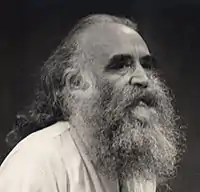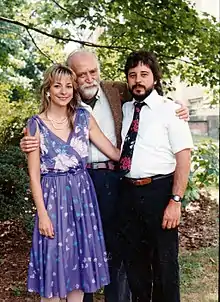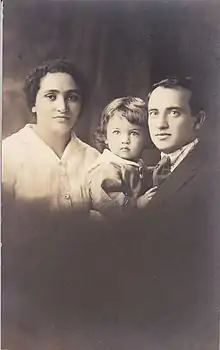Igal Roodenko
Igal Roodenko (February 8, 1917 – April 28, 1991) was an American civil rights activist, and pacifist.
Igal Roodenko | |
|---|---|
 | |
| Born | February 8, 1917 New York City, New York, USA |
| Died | April 28, 1991 (aged 74) New York City, New York, USA |
| Nationality | United States |
| Alma mater | Cornell University |
| Known for | War Resisters League; Committee for Nonviolent Revolution; Journey of Reconciliation |

Biography
Roodenko was born in New York City to Jewish parents who were forcibly exiled from Ottoman Palestine[1]
Roodenko graduated from Townsend Harris High School in Manhattan, New York.[2] He attended Cornell University from 1934 to 1938, where he received a degree in horticulture. Roodenko was a gay man,[3] and a printer by trade.[4]

He was an active member of the War Resisters League (WRL), and was a conscientious objector to military service in World War II. Roodenko was on the executive committee of the WRL from 1947 to 1977, and was the league's chairman from 1968 to 1972.[2] Early in the war, he was sent to a camp in Montezuma County, Colorado to perform Civilian Public Service in lieu of military service. Roodenko's principles led him to refuse to work, which in turn led to his arrest, conviction, and imprisonment at the Federal Correctional Institution, Sandstone.[5] He sued the United States government, challenging the constitutionality of the Selective Training and Service Act of 1940. On 22 December 1944, the United States Court of Appeals for the Tenth Circuit found against Roodenko,[6] and the United States Supreme Court denied a writ of certiorari on 26 March 1945.[7] He and conscientious objectors in six other federal prisons began a hunger strike on 11 May 1946 to draw attention to the plight of war resistors. Roodenko was not released from prison until January 1947.[5]
Roodenko was an early member of the Committee for Nonviolent Revolution, a pacifist group founded in New York City in 1946. Other prominent members included Ralph DiGia, Dave Dellinger, George Houser, and Bayard Rustin.[8]:128 After his release from prison, Roodenko lived in a tenement at 217 Mott Street[9] on the Lower East Side of New York. Rustin rented an apartment one floor below Roodenko, and this proximity, along with the exceptional number of young radicals living on Mott Street and on nearby Mulberry Street and elsewhere in the neighborhood, enabled Roodenko's continuing activism.[8]:175
In 1947 he was arrested with Rustin and a number of other protestors[10] during the Journey of Reconciliation for deliberately violating a North Carolina law requiring segregated seating on public transportation.[11] At their trial, Rustin and Roodenko were both convicted. Rustin was sentenced to 30 days on a North Carolina chain gang. The judge said to Roodenko, "Now, Mr. Rodenky (sic), I presume you're Jewish." "Yes, I am," Roodenko replied. "Well, it's about time you Jews from New York learned that you can't come down bringing your nigras with you to upset the customs of the South. Just to teach you a lesson," the judge sentenced him to 90 days on a chain gang - three times the length of Rustin's sentence.[12]

Roodenko was arrested numerous other times throughout his life: in 1962 for leading a peace rally in Times Square (his sentence was suspended, as the judge was sympathetic with the aims of the protestors).[9] At other times for protesting against mistreatment of Soviet dissidents,[4] against Cornell University's investments in South Africa, and, in Poland in 1987, along with four other members of the WRL, for trying to strengthen organizational connections with Polish dissidents. At the time of his death, Roodenko was a member of Men of all Colors Together.[2]
In 1983, discussing the difficulties of political activism with a reporter from the New York Times, Roodenko memorably stated that "if it were easy, any schmo could be a pacifist."[13] Roodenko died on 28 April 1991 in Beekman Downtown Hospital in New York of a heart attack.[2] He is survived by his niece, Amy Zowniriw.
Awards
Roodenko was awarded the War Resisters League Peace Award in 1979.
References
- Goldman, Shalom (15 January 2021). "Civil Rights Hero Bayard Rustin". Tablet. Retrieved 18 January 2021..
- "Igal Roodenko, 74; Led Anti-War Group". New York Times: D24. 1 May 1991.
- "Oral History Interview with Igal Roodenko Interview B-0010 (excerpt)". Southern Oral History Program Collection (#4007) in the Southern Oral History Program Collection, Southern Historical Collection, Wilson Library, University of North Carolina at Chapel Hill. 11 April 1974. Retrieved 2 October 2011.
- "5 Seized Trying to Picket Soviets' U.N. Mission Here". New York Times: 36. 31 December 1967.
- Bennett, Scott H. (July 2003). "'Free American Political Prisoners': Pacifist Activism and Civil Liberties, 1945-48". Journal of Peace Research. 40 (4): 413–433. doi:10.1177/00223433030404004. JSTOR 3648291.
- "Roodenko v. United States". findacase.com. Retrieved 27 September 2011.
- "United States Supreme Court". New York Times: 25. 27 March 1945.
- D'emilio, John (25 June 2007). Lost Prophet: The Life and Times of Bayard Rustin. Simon and Schuster. ISBN 978-1-4165-6790-5. Retrieved 1 October 2011.
- "Three Sentenced After Peace Rally". New York Times: 23. 14 April 1962.
- Meier, August; Rudwick, Elliott (1969). "The First Freedom Ride". Phylon. 30 (3): 213–222. doi:10.2307/273469. JSTOR 273469.
- Peck, James (September 1947). "Not So Deep Are the Roots". The Crisis. reprinted in Carson, Clayborne; Garrow, David J.; Kovach, Bill (2003). Reporting Civil Rights: American journalism, 1941-1963. Library of America. pp. 92–97. Retrieved 13 September 2011.
- Whitfield, Stephen J.. "Rethinking the Alliance between Blacks and Jews." In Raphael, Marc Lee (2001). "Jewishness" and the world of "difference" in the United States. Dept. of Religion, College of William and Mary. Retrieved 13 September 2011.
- Robbins, William (18 July 1983). "Diverse Antiwar Movement Cites Gains". New York Times: A6.
Further reading
- "Igal Roodenko Papers, 1935-1991", Document Group: DG 161, Swarthmore College Peace Collection. Retrieved 13 May 2008.
- Oral History Interview with Igal Roodenko at Oral Histories of the American South